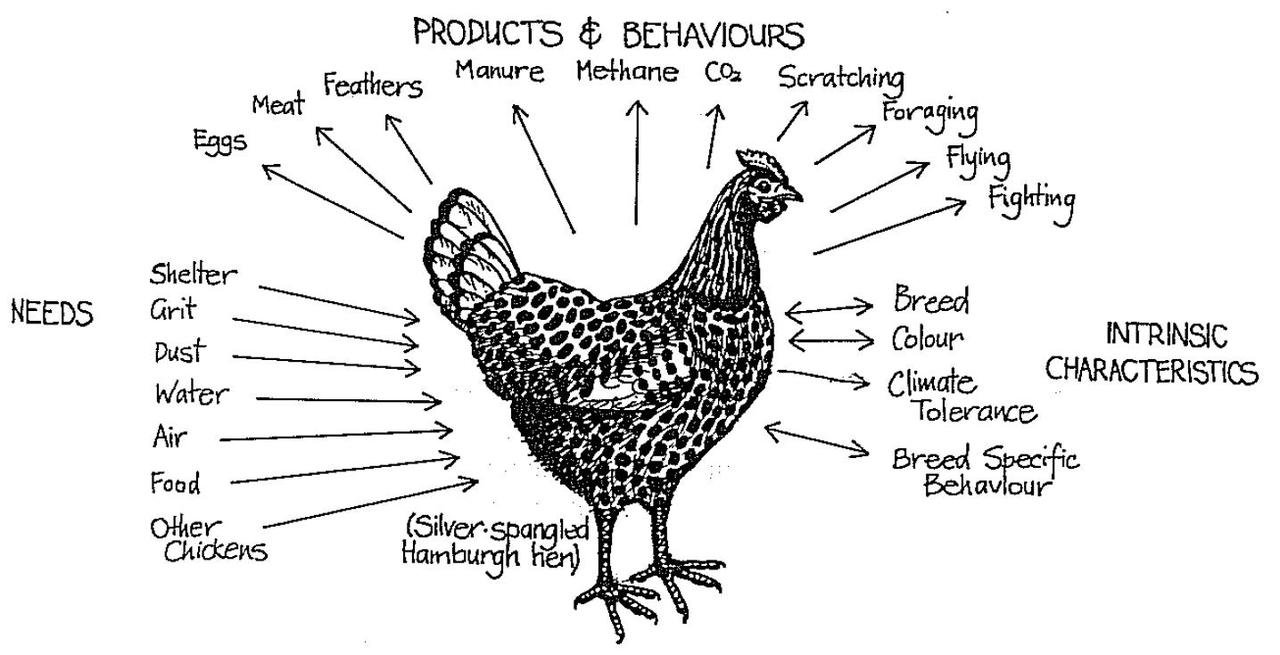Chickens are more than a food source, they plant my whole garden, working from sunrise to sunset, weeding, fertilizing, controlling pests and planting, if you know how to manage them.
Industrial poultry producers, motivated by more profits, fund more research on chickens than any animal, a subject covered extensively in Annie Potts book, Chicken
Gallus, or chicken, is the most studied species in the world. The first species to have a complete genemap, they have been assiduously scrutinized with the aim of rendering chickens 'more serviceable to humans'.
I posit chickens are already 'more serviceable to humans' just the way they are. Human's limited view of chickens as solely a food source needs a broader understanding. ##=
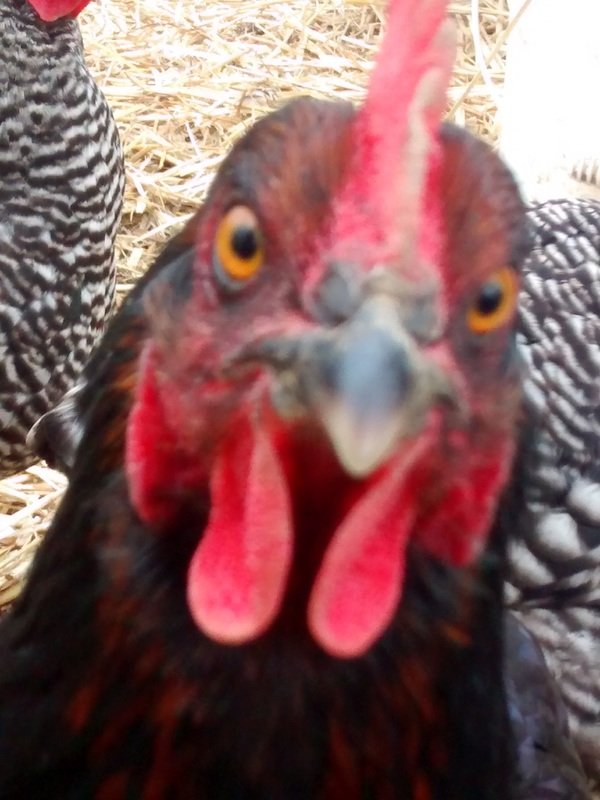
I'm a chicken, you got a problem with that?
A closer look at chickens reveals that their usefulness as food just scratches the surface of what they can do for a farmer or gardener and properly managed, chickens can produce more food than just eggs and meat. We'll explore that more in this post but first, let's dig deeper into what 'services' a chicken can provide. ##=
Chickens have certain needs beyond food and water in order to fully express their "chickeness". Bill Mollison, coauthor of Permaculture - A Designer's Manual, famously illustrates the products and behaviors of chickens in his illustration from his book.
Chickens produce manure and feathers, which are both high in nitrogen, phosphorus and calcium and needed by nutrient demanding vegetables.
Feathers decompose slowly, releasing their nutrients into the soil gradually, while the nutrients in chicken manure are released quickly, immediately available to the soil biota. Feathers and manure combined provide a stable supply of essential nutrients, both immediate and long-term, for soil and plant life to thrive.
Housing chickens in a fixed structure, accumulates a nutrient build up that is detrimental to the soil and the environment proportional to the amount of manure built up. That's why gardeners know to compost chicken manure first, before using it in their garden. Today, you'll learn how to make that problem your solution.
Chickens also love to scratch and forage, looking for seeds, grit, bugs and slugs and in the process will eliminate weeds and pest problems entirety.
They will destroy your whole garden if you let them, ruining your veggie beds, but with the right management, they can do the work of a whole crew of farm workers better than humans and they're never late for work and won't call in sick.
Most people keep chickens in a coop, feeding them grain in exchange for eggs, but my grandfather taught me how to use chickens to grow an abundant supply of fresh greens and vegetables right outside your door with so little work involved on your part, you'll feel you should be paying them.
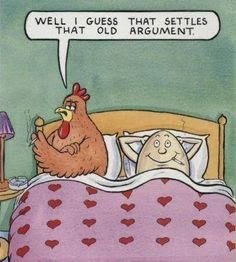
We have about 30 hens and very happy rooster named Rocky. Eggs aren't the only thing getting laid on this farm.
Last year I had a fenced chicken run close to the house. Everyday we would empty a bucket of food scraps for the chickens to rummage through and collect a couple dozen eggs per day. They loved the scraps and we loved the eggs, but chickens can do so much more than lay eggs.
The key to harnessing chicken labor, if you will, is in understanding a chickens behavior.
As I mentioned , chickens naturally love to scratch the ground for seeds, bugs and grit and are quite content doing so all day long from sunrise to sunset.
If they are contained, as in a pen or chicken run, they will eventually find everything there is to find in that area and get bored.
Yes, chickens get bored and when they do they will either try to escape from their confinement searching for new territory to explore or, depending on the size of the area they are contained in and the amount of chickens in that space, they will start picking on each other.
Boredom is often the countdown to trouble or at least a grudging discontent. I wouldn't want that for humans or chickens so I keep my chickens entertained.
Chicken Entertainment
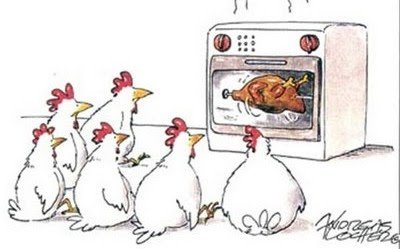
The Chicken Channel Image credit
So how does one entertain chickens? Do you get them Netflix in their coop playing The Chicken Channel 24/7? Do you ask them to go chicken dancing or just play chicken. No, you give them something to do.
They say the grass is greener on the other side of the fence and in the case of a permanent chicken run, that's often literally true. Personally, I've always believed grass is greener where you water it, but that's another story.
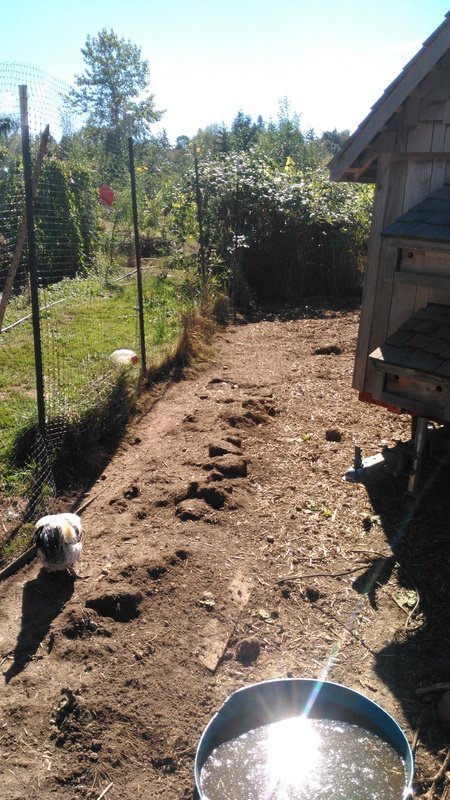
For chickens, the grass is literally greener on the other side of the fence.
Make no mistake, I do contain them, to protect them from predators, using something my grandfather didn't have, electric poultry netting. 150 feet of poultry netting weights about 12 pounds, making it easy to move to new locations throughout the garden.
The netting keeps them protected and protects my vegetables from being destroyed by the chickens, while allowing me to move the chickens often enough that they don't build up too much manure in the soil.
Having them scratching away so close to my growing garden with just a 4 foot net between them and potentially devastating my garden, it's critical that they never get bored.
By controlling the duration the chickens remain on any one spot, they will fertilizer the soil with the right amount of nutrients, find and destroy pests, remove weeds and eat weed seeds deep enough in the soil to be capable of germinating. They need to express these behaviors and get bored out-of-their-minds if they can't.
Moving them to "new ground" to explore is all the entertainment a chicken needs and moving them often, turns the problem of nutrient build up into the solution of balanced soil fertility.
Once I move them to a new spot, I plant behind them in the area they were just moved from. The area is perfectly prepared and ready to plant or sow.
Because chickens don't weigh much, they don't compact the soil and their scratching and digging creates the perfect soil structure for a garden.
What if your space is small?
I realize you may have a small yard and can't be moving chickens everyday. Keeping them in a permanent, fenced chicken coop may be your only option. Here's how to provide for your chickens needs without overfertilizing the soil.
Last year, we had an area close to the house that was overrun by buttercup and canary grass. Buttercup grows a thick mat of foliage that's difficult to get rid of once established and nearly impossible to plant a vegetable garden in. It's hard to dig out but not nearly as hard as the canary grass growing there as well.
Being so close to the house and receiving full sun all day, it was a perfect location for growing vegetables. No problem. Chickens to the rescue.
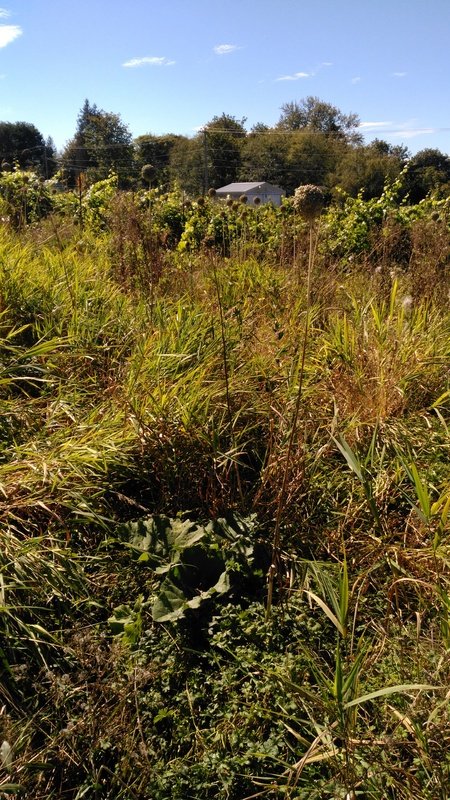
This was the field before the chicken crew arrived.
Here's what we did
First we moved their coop, built on a trailer, into the the buttercup/canary grass-invaded area. Then we strung up the netting around it to contain them.
Next we sprinkled grain over the buttercup and the chickens got right to work scratching it into oblivion in search of the grain. A month later it had vanished, but I knew the roots were still there and it would come back with a vengeance as soon as the chickens were moved.
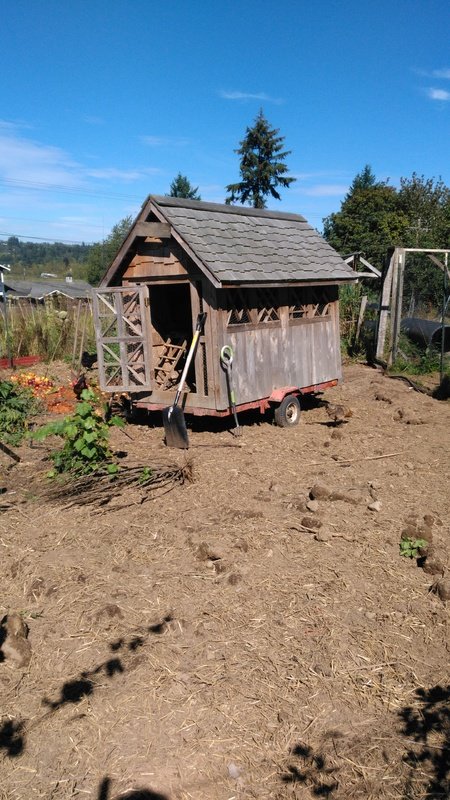
This is what 30 chickens did after 3 months on the same spot
So next, we covered the whole chicken run with a six inch layer of straw. This solves several problems.
Buttercup and canary grass do not like to be buried in mulch so they died completely in six months. Good riddance. It also keeps the chickens busy scratching through the straw. In addition, the layer of straw acts like, as Joel Salatin so humoursly puts it, ' a carbacious diaper'.
Composting 101 teaches, in making compost, that a carbon to nitrogen ratio of 15:1 (up to 30:1), meaning, 15 parts carbon to 1 part nitrogen will create the ideal compost. What's this got to do with straw and chickens?
Remember, chicken manure is high in nitrogen, so the buildup of nitrogen increases the longer the chickens remain in one spot. I had to keep them there.for 6 months before all the canary grass died, risking adding too much manure to the soil.
Straw, on the other hand is high in carbon. Adding straw, layer by layer, over the entire season, created a compost pile that covered the entire chicken run. This, in turn, changed the soil condition, rendering it unsuitable for buttercup or canary grass and made it perfect for a vegetable garden.
I plant beans, peas and tomatoes on the outside of the chicken run fence. As the plants climbed the fence it provides shade for the chickens, and depending which side of the fence you are on, food for people and chickens.
All season long we would throw all our crop waste and food scraps in there. Corn, tomatoes, potatoes, kale, onions, you name it.
In November, we moved the chickens into a large coldframe for the winter and planted the area they just moved from with a cover crop to capture all of the nutrients accumulated that season and prevent weeds from blowing in with the wind and taking it over.
The next spring I didn't have to plant anything in this perfectly prepared soil. All I did was shape the soil into raised beds and water it. Shaping the beds in spring disturbed the 2 foot thick layer of rich soil, filled with last season's seeds and it exploded into a garden.
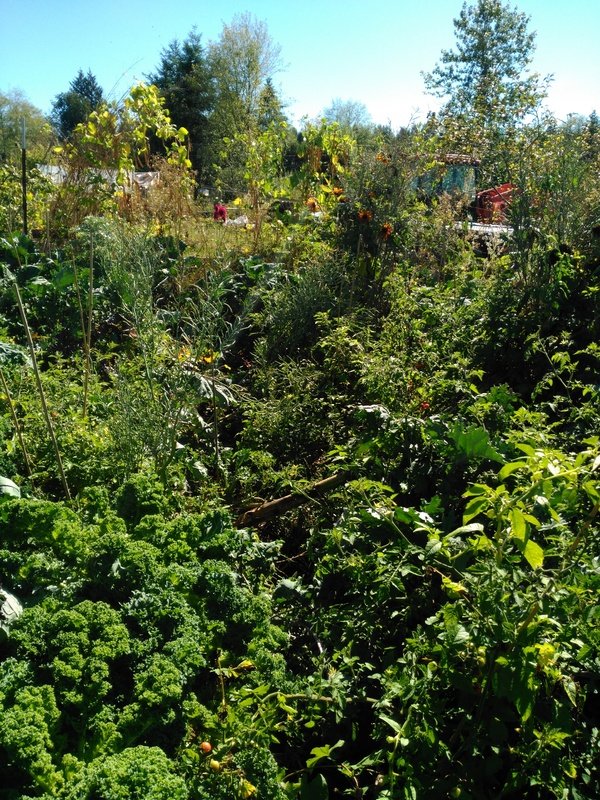
The following season the chicken-planted garden exploded with vegetables
The soil was teaming with earthworms, full of nutrition and the vegetables are my weeds. (Sounds like a cool Tee shirt, "Vegetables are the new weeds")
I rarely water, never have to weed or worry about bugs and food is steps from the house from March until November. This foods not normal, it's the healthiest, most vibrant looking food you can imagine.
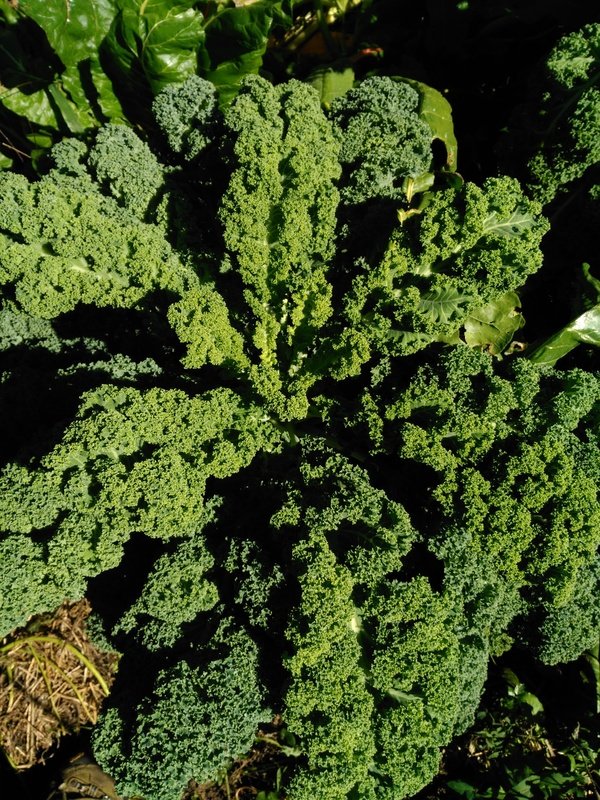
Been picking this kale for 5 months and it just keeps growing.

